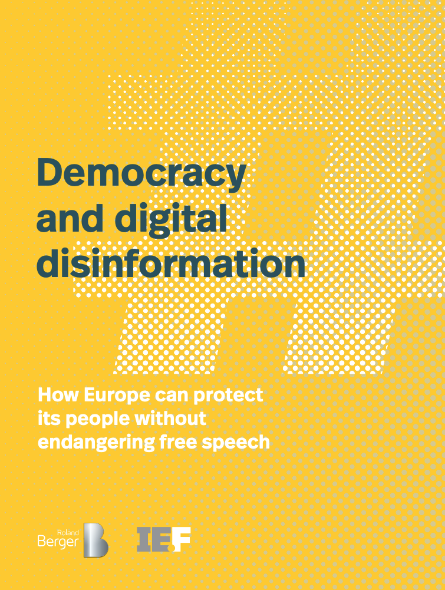Fake News – Democracy and Disinformation
![{[downloads[language].preview]}](https://www.rolandberger.com/publications/publication_image/Roland_Berger_STU_612_Fake_News_Cover_download_preview.png)
Without regulation the rapid spread of unfiltered fake news has the potential to seriously endanger democracy.


"Stricter rules protect users from political disinformation but can restrict freedom of expression."
The rise of Facebook & Co. is challenging politics: It has never been easier to spread "fake news" on a large scale. In a joint study, Roland Berger and the Internet Economy Foundation (IE.F) therefore call for a rethink: If you want to effectively combat "fake news," you have to readjust the balance between freedom of opinion and user safety.
"Fake news" has become an integral part of the political debate. New reports about manipulation attempts on social media appear almost weekly. This poses a serious threat to democracy. Almost three quarters of 18 to 29-year-old Europeans now consume news on the Internet every day. Increasingly, they are confronted with disinformation.

The revolutionary business model of the major US platforms is partly to blame for this development. According to the authors of the study, the increase in consumption of news via social media is providing Facebook and Co. with record-breaking margins of up to 40 percent. At the same time, it has created a communication climate in which "fake news" thrives particularly well. Not least because the platforms' filter algorithms are aimed at "engagement" and no longer select content according to generally credible journalistic criteria.
There is therefore no way around stricter rules. The question is who should set them? Private companies like Facebook? Or governments, as is already the case in China and Russia? In the authors' view, neither of these options is really desirable.
Unlike hate comments, "fake news" falls into a grey area that is not relevant under criminal law. They cannot be forbidden without severely restricting freedom of opinion. Every society must therefore decide for itself where it draws the line. But the main goal of regulation should be a different one: Strengthen the sovereignty of the user and ensure the greatest possible transparency on online platforms.
This basic idea guides the study's five recommendations:

![{[downloads[language].preview]}](https://www.rolandberger.com/publications/publication_image/Roland_Berger_STU_612_Fake_News_Cover_download_preview.png)
Without regulation the rapid spread of unfiltered fake news has the potential to seriously endanger democracy.